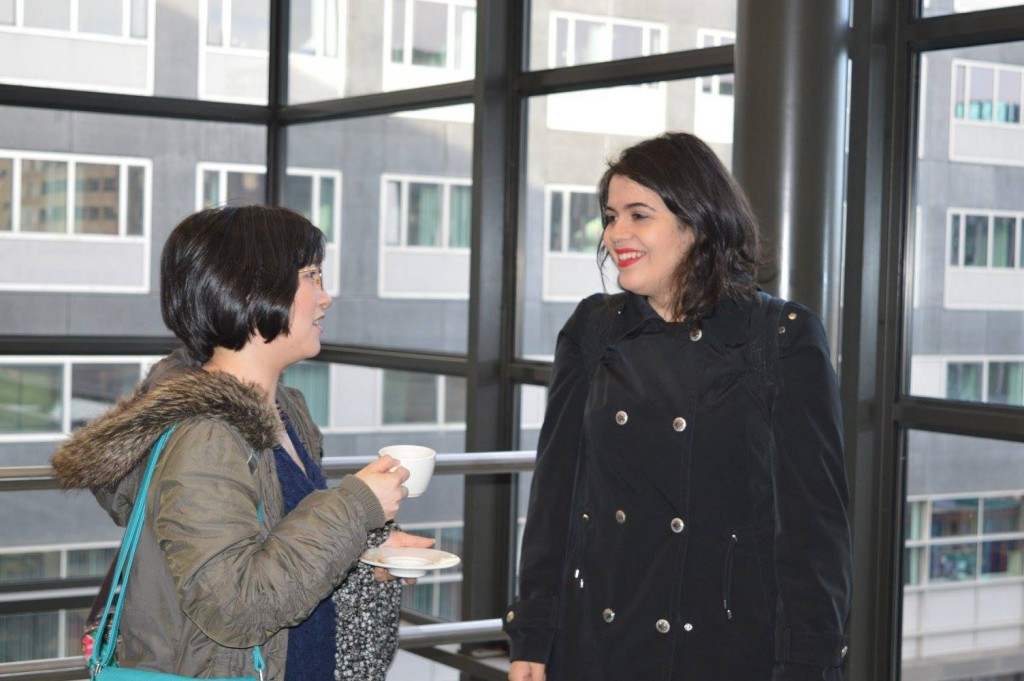
Yours truly at EFC15 (left), with Camila Monteiro (right). (Source: Facebook).
Earlier this month I was thrilled to be present my research so far at the European Fan Cultures conference at Erasmus University, Rotterdam, made possible by the stellar organisation of Simone Driessen, Leonieke Bolderman, and Abby Waysdorf. I was on Panel 2B, the ‘Fans as Gatekeepers’ track; and as it happens, that was pretty much exactly the title of my presentation, which was Fans as gatekeepers: The role of cult media fans in collecting, preserving and sharing fanworks. This presentation summarised the research done for my doctoral thesis so far, particularly focusing on the results of a Delphi study conducted between February and September 2015.
I was initially nervous of presenting my findings, since my background, whilst it is the arts and humanities, is not specifically in fan studies, and my current focus is, as I have mentioned before on this blog, on Library and Information Science (LIS). I therefore cannot pretend to be as familiar with the discipline of fan studies as those who study in the field, and presenting to those who do can be daunting. I need not, however, have worried. The conference included presentations from scholars that represented a wide range of backgrounds, from marketing to psychology to human geography. There was a diversity of theories, methodologies, and practical applications that is rarely seen in other fields; and I think this speaks to the recent growth and huge potential in fan studies to embrace different disciplines – and vice versa. The conference turned out to be a great space of researchers of different backgrounds to share ideas, find unexpected commonalities, and to broaden horizons by opening up one’s peers to possibilities and ways of working that they might not have previously entertained. Even the live tweeting reflected this:
. @LudiPrice coming from a library sciences perspective- her & the Galimberti-Spanó talk earlier suggests the diversity in the field. #efc15
— Abby Waysdorf (@awfully_good) November 12, 2015
All this helped to dissipate my initial anxiety, as I was pleasantly surprised to realise that there was a warm openness to these different approaches to fan studies, and that my own LIS approach to fan studies was received with interest. Even the explanation of the Delphi study – that research method that no one has ever heard of and takes a million years to explain – was met without too much resistance!

Cornel Sandvoss (of Fans: The Mirror of Consumption fame) gives a fascinating keynote. (Source: Facebook)
I won’t go into too much detail regarding the presentation – if you’re so inclined, you can view the slides at this link: Fans as gatekeepers EFC15 (best-viewed when played). To summarise both the presentation and the results of the Delphi study, consensus amongst panel members was surprisingly high, and, most gratifyingly, the majority of statements in which the highest confidence was placed was on those that regarded the information behaviour of fans. This means that, amongst the study’s panel, there was an extremely high level of agreement about how fans collect, organise and disseminate fan-related information and fanworks. It became clear, through these results, that information management, sharing and sourcing are all significant aspects of fan activity, but that it is so intrinsic to it that fans aren’t even aware of it as being ‘information work’. This became clear during the question section of the presentation and in conversations afterwards, when audience members shared their own recognition of this being a part of fan practice, but not usually in a self-aware way. This was heartening because it meant that this was an area of research that had little coverage and was worth further investigation.
Lastly, I wanted to add that I was amazed at how much overlap there was between my own research and the research of those present. My own panel included presentations on fans as producers (produsers?) of user-generated content, and on the ‘fan press’ or fan journalism – all of which are concerns of LIS. In a wider context, I was surprised to learn that more than one conference attendee had done past research on fan wikis, and that – put bluntly – I was not alone! Which is always a good feeling.
All in all, I can safely say that the conference was a fantastic experience, with a friendly, welcoming vibe and some great opportunities for networking. Many thanks to the organisers for making this a such a super experience for a first-time presenter and early-career researcher.
(The abstract from the conference can be viewed here).